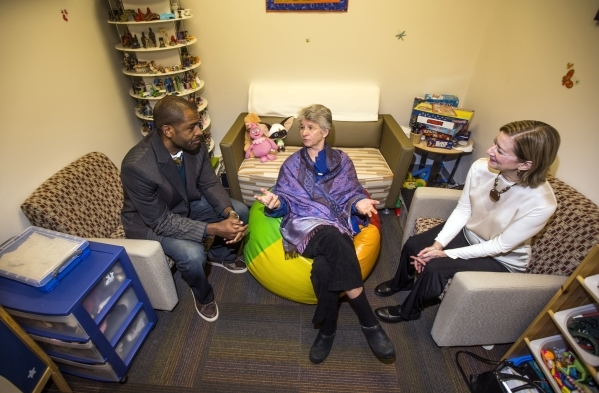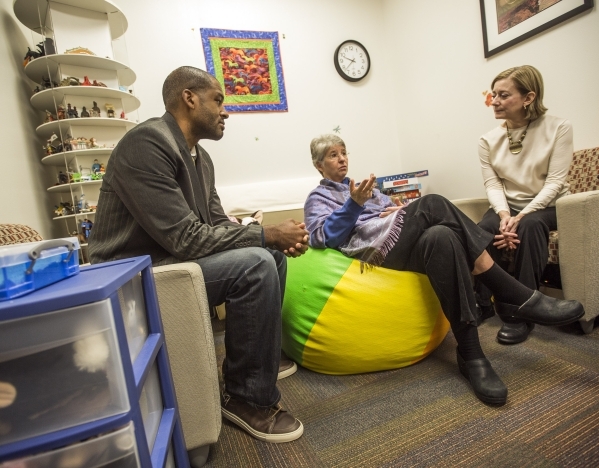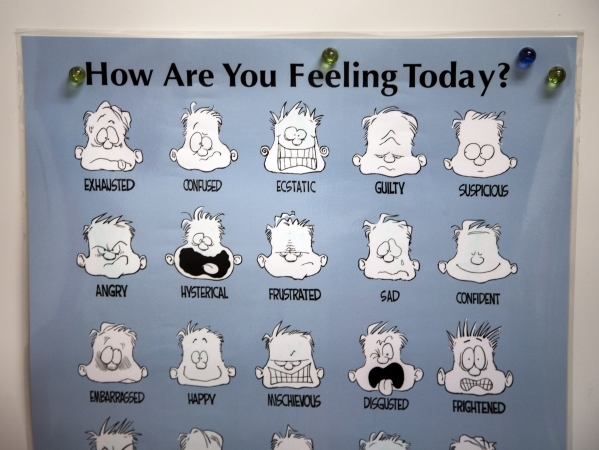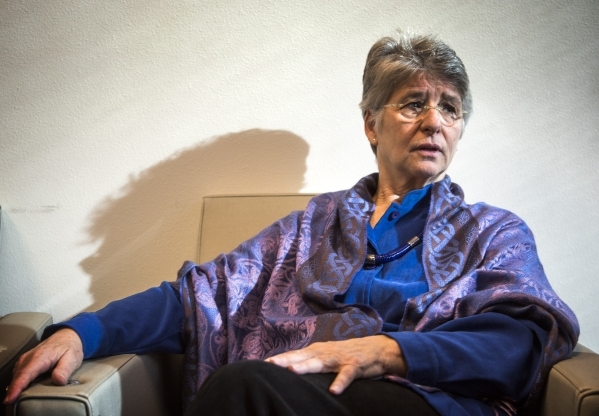Anxieties up? For-profit university offers free mental health screening
Feel the need to bypass your prefrontal cortex and get to the heart of what's bugging you?
Stroll down the hall to the play therapy room at the University of Phoenix's Counseling Skills Center, at 3755 Breakthrough Way, in Las Vegas.
For both adults and kids, the room rivals Santa's digs at the North Pole. It comes equipped with plastic dinosaurs, killer bees, fake money, cell phones galore, a play theater with puppets, action figures, and "moon sand" for those who like to dig a little.
Into the psyche, that is.
"You want to have in play therapy something that symbolizes everything in the cosmos," explained Kitty Unthank, Campus College Chair of the University of Phoenix's College of Social Sciences. "Or, that you can imagine."
The center also offers another perk: free mental health screening, along with free confidential counseling provided by students pursuing a master of science in counseling at the University of Phoenix. Faculty members who are licensed professionals keep an eye on sessions in the center's four treatment rooms via camera and other avenues.
Once the camera stops rolling, students can review their video, and their supervisor's inserted comments.
According to Unthank, approximately 150 students are enrolled in the program on the Las Vegas campus. After two years of course work, they move into the realm of practical experience in their third year, often landing at one of approximately 30 Clark County agencies.
The for-profit institution serves working adults. And, the hodge-podge of students in the program includes sixty-somethings, twenty-somethings, business people, shop owners, and teachers.
Clinical Director Lynne Smith said most come through the Counseling Skills Center for their initial real-world experience. About 10 people are currently working at the center, which has the capacity to offer 1,000 client hours per month.
The center opened its Las Vegas campus location this past May. It advertises services addressing issues such as bullying, test-taking anxiety, gender identity and couples and family counseling.
But students in training also work with homeless people trying to reboot, the undocumented population, and people who've been relegated to wait lists at other agencies for months.
In Southern Nevada, where there's a shortage of mental health services, according to Sheldon Jacobs, clinic site supervisor and core faculty member, free counseling is a valuable commodity. And, clients have other good reasons to reach for that fake money in the play therapy room.
"I notice the patterns with the economy and the recession," he said. "People who struggle to get back on their feet."
There are also all those talking gas pumps.
"I don't listen to the news because it's too distressing for me," said Smith. "I was filling my gas tank and I heard about all the shootings in Clark County."
"What that means is, we don't have choice anymore about what's coming into our eyes and ears," added Unthank. "We're constantly bombarded with violence. You experience powerlessness."
Amid shootings, terrorism and financial woes that hit even closer to home, "trauma is like running a low-grade fever," she said. "Everybody's anxieties are up."
"We're all walking around running a low-grade fever," she added. "That comes down to why we're happy to offer free services to a population that can't have access as readily."
Fortunately for the center's clientele, the play therapy room is a gun happy zone. If you're talking, NERF guns.
Even parents with a distaste for guns OK the weaponry, because "being able to have free expression in a contained environment is good for children," said Smith.
But for those who venture beyond the play therapy room, beware the holiday pitfalls. Like Bing Crosby's rendition of "I'll be Home for Christmas," born of a war-time mentality that's been growing since World War II, with help from radio and television, according to Unthank.
Whether thinking about music that represents an era, or exploring family patterns through genograms, students in training do their fair share of globe-trotting across the collective unconscious.
They also get a dose of everything from Gestalt therapy to cognitive behavioral therapy. In actual practice, Smith said, "We're encouraging students to find the best fit for their theory. So they're allowed to try on different evidence-based interventions. It gives them the freedom to evolve their identity as therapists."
But don't expect sessions to be all talk.
"Everybody has the idea that therapy is just talking," said Unthank. "No very good therapy is just going to be talking."
To drop below the neck, into the body – and emotions – clients might be invited to draw, dance, or play with clay. Or, just plain play.
Joseph da Costa, in his last year of the program, said he'd go to the moon sand first. He's been working at the center for the last 30 weeks.
"I think that a lot of people are afraid of counseling, and I don't think it's anything to be afraid of," he said.
He's already seen clients make positive changes in their lives.
After he's given them tools, he finds fulfillment when "they come in and tell you how they've implemented that tool in a way you never anticipated."






















